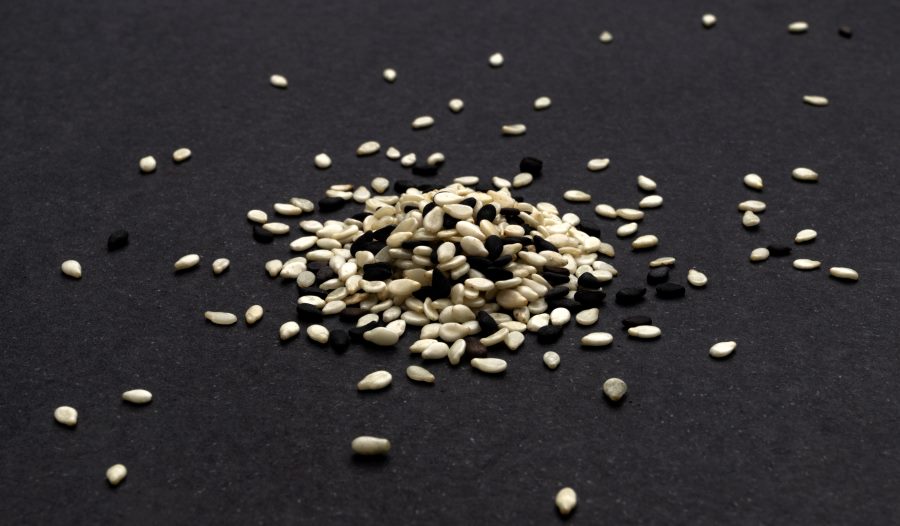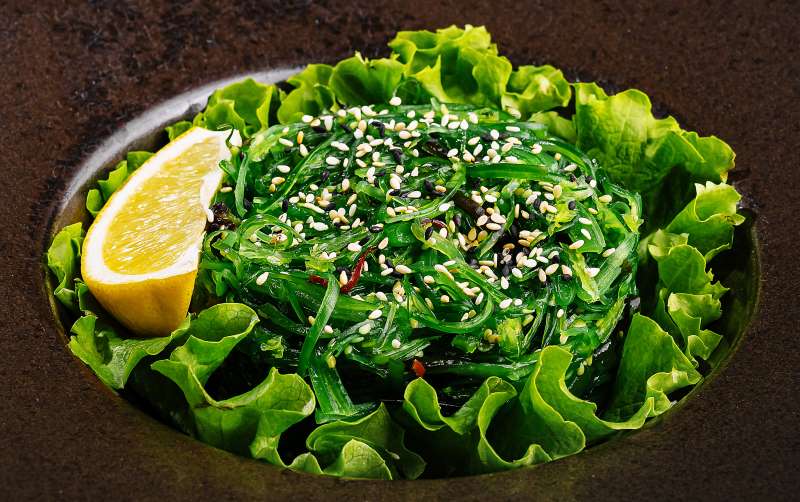13 Amazing Health Benefits of Sesame Seeds

Sesame seeds are a rich source of minerals and gained a special place in Ayurveda for the multiple health benefits they offer. From maintaining skin health to controlling blood sugar levels, sesame seeds help to keep your body healthy. This blog illustrates the health benefits of sesame seeds, their nutritional value, and simple ways to increase your daily intake of sesame seeds. So, to know all about these, continue reading!

Table of Contents

Top 13 Health Benefits of Sesame Seeds
Sesame seeds are very beneficial for physical as well as mental health. Here are the following health benefits of sesame seeds:
1. Develops Stronger Bones
Sesame seeds contain a high amount of calcium that helps in developing strong bones. Besides, zinc content in these seeds helps in strengthening the bone structure.
2. Controls Blood Sugar
Sesame seeds are extremely beneficial for diabetic patients as it helps to maintain blood sugar levels. In the long run, it serves as a natural regulator of blood sugar due to its low content of carbohydrates but high content of healthy fats and protein. Further, pinoresinol, a lignan found in a plant, is present in sesame seeds and plays a crucial role in controlling blood sugar levels.
3. Maintains Blood Pressure Levels
Sesame seeds are high in magnesium content. This mineral assists in preventing blood pressure and hypertension. Additionally, the presence of vitamin E, lignans, and other vital antioxidants prevents the buildup of plaque in the arteries, thereby regulating blood pressure levels.
4. Eases Arthritis Pain and Respiratory Issues
Sesame seeds offer a much-needed amount of essential minerals such as magnesium, copper and calcium to your body. Copper helps in relieving pain suffered in rheumatoid arthritis. At the same time, magnesium content helps in easing respiratory problems.
5. Promotes Healthy Hair and Skin
One of the major health benefits of sesame seeds is that they promote healthy hair and skin. This is because these seeds are a rich source of vitamin B complexes, which include niacin, thiamine, folic acid, riboflavin, and pyridoxine. These are the best natural alternatives to get healthy hair and skin. Apart from consuming seeds, you can massage your scalp and body with sesame oil once a week to improve your hair and skin.
6. Improves Thyroid Health
The thyroid gland in your body has the highest amount of selenium. This plays an essential role in producing thyroid hormones. Both unhulled and hulled sesame seeds provide around 18% of the selenium of the RDI or Reference Daily Intake. Thus, these seeds are extremely beneficial in combating thyroid issues. Moreover, the presence of vitamin B6, copper, zinc and iron supports the proper production of thyroid hormones and maintains thyroid health.
7. Boosts Immunity
Sesame seeds are packed with essential minerals like zinc, which strengthen your body's immunity. Consuming zinc develops T-lymphocytes. These are an essential part of your body's immune system and help to fight against microbes.
8. Maintains Mental Health
Oil derived from sesame seeds contains tyrosine and amino acids, which affect the functioning of serotonin. Serotonin is a neurotransmitter that impacts your mood, and any imbalance in it leads to stress and depression. Sesame oil helps to create serotonin which lowers the chances of developing anxiety or other issues and maintains overall mental well-being.
9. Helps to Cure Constipation
You can consume black sesame seeds to cure constipation. These seeds are high in unsaturated fatty acids and fibre. The fibre content and oils in these seeds regular proper bowel movements.
10. Reduces Cell Damage and Inflammation
Oils extracted from sesame seeds contain sesaminol and sesamol. These help in reducing damages caused to cells due to free radicals. These oils have anti-inflammatory properties to cure inflammation in joints, scrapes and toothaches.
11. Hormonal Balance
Sesame seeds are rich in nutrients that support hormonal balance. They contain phytoestrogens, which mimic oestrogen and can help manage hormone levels, particularly during menopause.
12. Antioxidant Properties
Sesame seeds are rich in antioxidants, which help protect cells from damage caused by free radicals. These tiny seeds contain sesamin and sesamol, compounds known for their strong antioxidant properties.
13. Heart Health
Sesame seeds are beneficial for heart health due to their high content of healthy fats, particularly polyunsaturated and monounsaturated fats. These fats help reduce bad cholesterol levels, lowering the risk of heart disease.
What are the Nutritional Values of Sesame Seeds?
Take a look at the nutritional value of sesame seeds per 100 grams in the table below.
Calculate Your Health Metrics Instantly
How to Include Sesame Seeds in Your Daily Diet?

To get the health benefits of sesame seeds, incorporate these seeds into your diet in three simple ways:
1. Use Sesame Seeds in Salads and Other Dishes
Add a crunch taste to your favourite vegetable or fruit salads by sprinkling toasted sesame seeds. You can also combine these seeds with steamed spinach or fried garlic to increase their nutritional values. Besides, you can add sesame seeds while making pan-fried chicken instead of using breadcrumbs.
2. Add Sesame Seeds into Ice Creams and Soups
Sprinkle some toasted sesame seeds into icecreams or soups like tomato or lentil soup to get the health benefits of sesame seeds.
3. Add Sesame Seeds As Seasoning
Bharat B. Aggarwal and Debora Yost's authored book 'Healing Spice' suggests a seasoning for grilled meats. This includes combining two tablespoons of coarse salt, 1 teaspoon of hot pepper flakes, two tablespoons of white and black seeds and cracked black peppercorns.
4. Add to Yoghurt
Mix sesame seeds into your yoghurt for added crunch and nutrition. They pair well with both plain and flavoured yoghurts. This is an easy way to enjoy the health benefits of sesame seeds. You can also add fruits and honey for extra flavour.
5. Garnish Sushi Rolls
Sprinkle sesame seeds on your sushi rolls for a traditional touch. They add a subtle nutty flavour and an appealing crunch. Use both black and white sesame seeds for a visually pleasing presentation. This is a simple way to make your homemade sushi healthier.
6. Mix into Rice and Grain Dishes
Stir sesame seeds into cooked rice, quinoa, or other grains. They enhance the texture and flavour of your dishes. Toast the seeds beforehand for a deeper taste. This is an easy way to make your side dishes more nutritious. Sesame seeds provide essential minerals and healthy fats.
7. Add to Energy Bars
Include sesame seeds in homemade energy bars for a nutritious boost. They add crunch and a nutty flavour that pairs well with nuts, dried fruits, and honey. This is a great snack option for a quick energy boost. Sesame seeds contribute protein and healthy fats.
What are the Side Effects of Overeating Sesame Seeds?
Consuming sesame seeds above the permissible daily dietary requirement may lead to the following side effects:
- Lower Blood Pressure and Sugar Levels in Your Body: These seeds are beneficial in maintaining blood sugar and pressure levels in your body. However, if you suffer from diabetes or cardiovascular diseases, consult with your doctor before consuming sesame seeds alongside your prescribed anti-diabetic or anti-hypertensive drugs. This is because sesame seeds may affect the medicinal effects of these drugs and may severely lower your blood pressure or sugar levels, as the case may be.
- Lead to Appendicitis: Appendicitis is caused due to the indigestible substances in your meal. Sesame seeds contain fibre that is not digestible and adds up to your stool. However, consuming an excess of fibre may create a layer over the appendix, which leads to pain and bloating.
- Cause Anaphylaxis: Anaphylaxis or allergic reactions due to eating sesame seeds may include symptoms like breathing difficulty, nausea, etc. Therefore, immediately talk to a doctor if you experience the same after eating sesame seeds.
- Weight Gain: Overconsumption of sesame seeds may lead to unhealthy weight gain as your body cannot digest excess fibre which gets stored in your stomach.
- Kidney Problems: High intake of sesame seeds, rich in oxalates, can contribute to kidney stone formation in susceptible individuals. People with a history of kidney stones should be cautious and limit their intake to prevent potential complications.
- High-Calorie Intake: The seeds' high-fat content, while healthy, can add significant calories to your diet. Overeating can result in an excessive calorie intake, hindering weight loss efforts or leading to weight gain.
- Diarrhoea: The high fibre content can act as a laxative when consumed in large quantities. Overeating sesame seeds may lead to diarrhoea, resulting in dehydration and nutrient loss.
- Nutrient Imbalance: Focusing too heavily on sesame seeds may lead to an imbalance in your diet. Over-reliance on these seeds can displace other essential nutrients, leading to deficiencies and overall poor nutritional balance.
- Thyroid Function: Sesame seeds contain goitrogens, which can interfere with thyroid function if eaten in large amounts. Overeating may exacerbate thyroid issues, particularly in individuals with existing thyroid conditions.
Who Should Avoid Eating Sesame Seeds?
While sesame seeds are highly nutritious and offer many health benefits, certain individuals should avoid consuming them. People with sesame allergies should steer clear, as reactions can range from mild to severe. You should avoid consuming sesame seeds if you experience the following circumstances:
- If you are undergoing surgery
- Experiencing allergic reactions
- Breastfeeding your child or pregnant
- If you are suffering from diabetes or cardiovascular diseases
- If you are suffering from gout or Wilson's disease
There are several health benefits of sesame seeds. However, overconsumption may conversely affect your health. Therefore, eat as per the daily dietary requirement. It's important to consume them in moderation and be aware of potential allergies. Incorporating sesame seeds into your diet can be a simple yet effective way to boost your overall well-being. Additionally, consult your doctor if you have any medical conditions before consuming sesame seeds.
Protect What Matters - Explore Other Insurance Options














